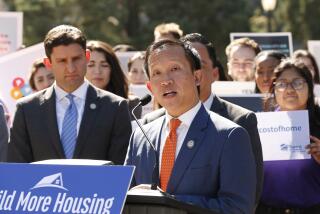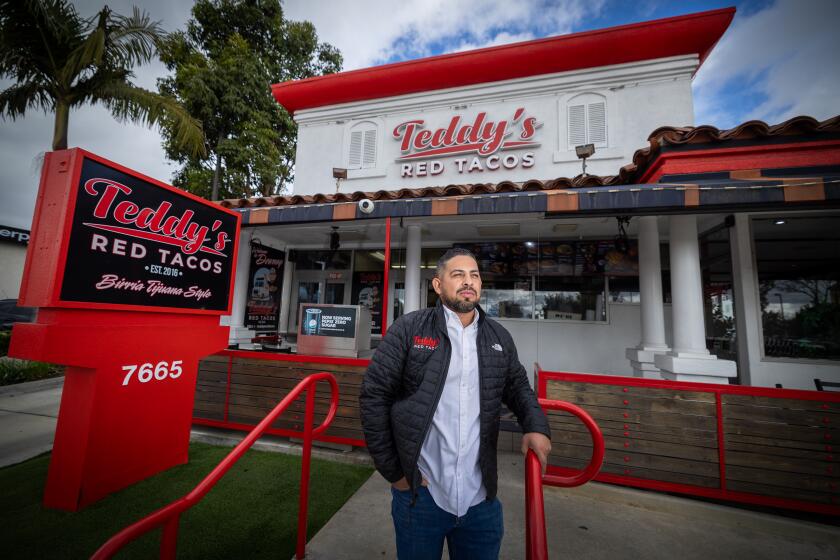Trump won’t block immigration arrests in houses of worship. Now these 27 religious groups are suing

- Share via
More than two dozen Christian and Jewish groups representing millions of Americans — ranging from the Episcopal Church and the Union for Reform Judaism to the Mennonites and Unitarian Universalists — filed a federal court lawsuit Tuesday challenging a Trump administration move giving immigration agents more leeway to make arrests at houses of worship.
The lawsuit, filed in U.S. District Court in Washington, contends that the new policy is spreading fear of raids, thus lowering attendance at worship services and other valuable church programs. The result, says the suit, infringes on the groups’ religious freedom — namely their ability to minister to migrants, including those in the United States illegally.
“We have immigrants, refugees, people who are documented and undocumented,” said the Most Rev. Sean Rowe, the presiding bishop of the Episcopal Church.
“We cannot worship freely if some of us are living in fear,” he told the Associated Press. “By joining this lawsuit, we’re seeking the ability to gather and fully practice our faith, to follow Jesus’ command to love our neighbors as ourselves.”
The new lawsuit echoes and expands on some of the arguments made in a similar lawsuit filed Jan. 27 by five Quaker congregations and later joined by the Cooperative Baptist Fellowship and a Sikh temple. It is currently pending in U.S. District Court in Maryland.
There was no immediate Trump administration response to the new lawsuit, which names the Department of Homeland Security and its immigration enforcement agencies as defendants. However, a memorandum filed Friday by the Justice Department opposing the thrust of the Quaker lawsuit outlined arguments that may also apply to the new lawsuit.
Churches took in refugees from battle-scarred Central America in the 1980s, a precursor to their current focus on undocumented immigrants.
In essence, the memo contended that the plaintiffs’ request to block the new enforcement policy is based on speculation of hypothetical future harm — and thus is insufficient grounds for issuing an injunction.
The memo said that immigration enforcement affecting houses of worship had been permitted for decades, and the new policy announced in January simply said that field agents — using “common sense” and “discretion” — could now conduct such operations without pre-approval from a supervisor.
One part of that memo might not apply to the new lawsuit, as it argued the Quakers and their fellow plaintiffs have no basis for seeking a nationwide injunction against the revised enforcement policy.
The plaintiffs in the new lawsuit represent a vastly larger swath of American worshippers — including more than 1 million followers of Reform Judaism, the estimated 1.5 million Episcopalians in 6,700 congregations nationwide, nearly 1.1 million members of the Presbyterian Church (U.S.A.), and the estimated 1.5 million active members of the African Methodist Episcopal Church — the country’s oldest predominantly Black denomination.
Among the other plaintiffs are the Christian Church (Disciples of Christ), with more than 3,000 congregations; the Church of the Brethren, with more than 780 congregations; the Convención Bautista Hispana de Texas, encompassing about 1,100 Hispanic Baptist churches; the Friends General Conference, an association of regional Quaker organizations; the Mennonite Church USA, with about 50,000 members; the Unitarian Universalist Assn., with more than 1,000 congregations; the United Synagogue of Conservative Judaism, with more than 500 U.S. congregations; and regional branches of the United Methodist Church and the United Church of Christ.
Pope rebukes Trump administration over migrant deportations, and appears to take direct aim at Vance
Pope Francis has issued a major rebuke to the Trump administration over the mass deportation of migrants.
“The massive scale of the suit will be hard for them to ignore,” said Kelsi Corkran, a lawyer with the Georgetown University Law Center’s Institute for Constitutional Advocacy and Protection who is lead counsel for the lawsuit.
The plaintiffs joined the suit, she said, “because their scripture, teaching, and traditions offer irrefutable unanimity on their religious obligation to embrace and serve the refugees, asylum seekers, and immigrants in their midst without regard to documentation or legal status.”
Before the recent Trump administration change, Corkran said, immigration agents generally needed a judicial warrant or other special authorization to conduct operations at houses of worship and other “sensitive locations” such as schools and hospitals.
“Now it’s go anywhere, any time,” she said. “Now they have broad authority to swoop in — they’ve made it very clear they’ll get every undocumented person.”
She cited a recent incident in which a Honduran man was arrested outside his family’s Atlanta-area church while a service was being held inside.
The lawsuit includes details from some of the plaintiffs as to how their operations might be affected. The Union for Reform Judaism and the Mennonites, among others, said many of their synagogues and churches host on-site food banks, meal programs, homeless shelters and other support services for undocumented people who might now be fearful of participating.
One of the plaintiffs is the Latino Christian National Network, which seeks to bring together Latino leaders with different traditions and values to collaborate on pressing social issues. The network’s president is the Rev. Carlos Malavé, a pastor of two churches in Virginia, who described to the AP what network members are observing.
“There is deep-seated fear and distrust of our government,” he said. “People fear going to the store, they are avoiding going to church. ... The churches are increasingly doing online services because people fear for the well-being of their families.”
The U.S. Conference of Catholic Bishops, which leads the nation’s largest denomination, did not join the lawsuit, though it has criticized Trump’s migration crackdown. On Tuesday, Pope Francis issued a major rebuke of the deportation plan, warning that the forceful removal of people purely because of their illegal status deprives them of their inherent dignity and “will end badly.”
Many conservative faith leaders and legal experts across the U.S. do not share concerns about the new arrest policy.
“Places of worship are for worship and are not sanctuaries for illegal activity or for harboring people engaged in illegal activity,” said Mat Staver, founder of the conservative Christian legal organization Liberty Counsel.
“Fugitives or criminals are not immune from the law merely because they enter a place of worship,” he said via email. “This is not a matter of religious freedom. There is no right to openly violate the law and disobey law enforcement.”
Professor Cathleen Kaveny, who teaches in the theology department and law school at Boston College, questioned whether the plaintiffs would prevail with the religious freedom argument, but suggested the Trump administration might be unwise to disregard a traditional view of houses of worship as places of sanctuary for vulnerable people.
“These buildings are different — almost like embassies,” she said. “I think of churches as belonging to an eternal country.”
Crary writes for the Associated Press.
More to Read
Sign up for Essential California
The most important California stories and recommendations in your inbox every morning.
You may occasionally receive promotional content from the Los Angeles Times.












